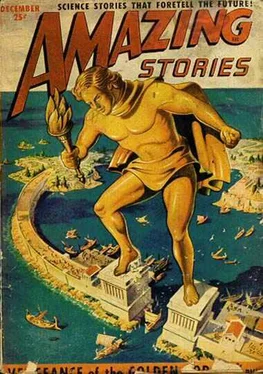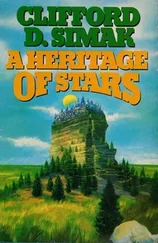Clifford Simak - Skirmish
Здесь есть возможность читать онлайн «Clifford Simak - Skirmish» весь текст электронной книги совершенно бесплатно (целиком полную версию без сокращений). В некоторых случаях можно слушать аудио, скачать через торрент в формате fb2 и присутствует краткое содержание. Год выпуска: 1950, Издательство: Ziff-Davis Publishing Company, Жанр: Фантастика и фэнтези, на английском языке. Описание произведения, (предисловие) а так же отзывы посетителей доступны на портале библиотеки ЛибКат.
- Название:Skirmish
- Автор:
- Издательство:Ziff-Davis Publishing Company
- Жанр:
- Год:1950
- ISBN:нет данных
- Рейтинг книги:5 / 5. Голосов: 1
-
Избранное:Добавить в избранное
- Отзывы:
-
Ваша оценка:
- 100
- 1
- 2
- 3
- 4
- 5
Skirmish: краткое содержание, описание и аннотация
Предлагаем к чтению аннотацию, описание, краткое содержание или предисловие (зависит от того, что написал сам автор книги «Skirmish»). Если вы не нашли необходимую информацию о книге — напишите в комментариях, мы постараемся отыскать её.
Skirmish — читать онлайн бесплатно полную книгу (весь текст) целиком
Ниже представлен текст книги, разбитый по страницам. Система сохранения места последней прочитанной страницы, позволяет с удобством читать онлайн бесплатно книгу «Skirmish», без необходимости каждый раз заново искать на чём Вы остановились. Поставьте закладку, и сможете в любой момент перейти на страницу, на которой закончили чтение.
Интервал:
Закладка:
Street lamps, he thought, and hunting cats and howling dogs — these are all a pattern, the pattern of human life upon the planet Earth. A solid pattern, linked and double-linked, made strong through many years. Nothing can threaten it, nothing can shake it. With certain slow and gradual changes, it will prevail against any threat which may be brought against it.
He unlocked the door and went into the house.
The long walk and the sharp autumn air, he realized now, had made him hungry. There was a steak, he remembered, in the refrigerator, and he would fix a large bowl of salad and if there were some cold potatoes left he would slice them up and fry them.
The typewriter still stood on the table top. The length of pipe still lay upon the draining board. The kitchen was the same old homely place, untouched by any threat of an alien life come to meddle with the Earth.
He tossed the paper on the table top and stood for a moment, head bent, scanning through the headlines.
The black type of the box at the top of column two caught his eyes. The head read:
WHO IS
KIDDING
WHOM?
He read the story:
Cambridge, mass, (up) — Somebody pulled a fast one today on Harvard University, the nation’s press services and the editors of all client papers. A story was carried on the news wires this morning reporting that Harvard’s electronic brain had disappeared. There was no basis of fact for the story. The brain is still at Harvard. It was never missing. No one knows how the story was placed on the press wires of the various news services but all of them carried it, at approximately the same time. All parties concerned have started an investigation and it is hoped that an explanation …
Crane straightened up. Illusion or cover-up?
‘Illusion,’ he said aloud.
The typewriter clacked at him in the stillness of the kitchen.
Not illusion, Joe, it wrote.
He grasped the table’s edge and let himself down slowly into the chair.
Something scuttled across the dining-room floor, and as it crossed the streak of light from the kitchen door Crane caught a glimpse of it out of the corner of his eyes.
The typewriter chattered at him. Joe!
‘What?’ he asked.
That wasn’t a cat out in the bushes by the porch.
He rose to his feet, went into the dining-room, and picked the phone out of its cradle. There was no hum. He jiggled the hook. Still there was no hum.
He put the receiver back. The line had been cut. There was at least one of the things in the house. There was at least one of them outside.
He strode to the front door, jerked it open, then slammed it shut again — and locked and bolted it.
He stood shaking, with his back against it and wiped his forehead with his shirt sleeve.
My God, he told himself, the yard is boiling with them!
He went back to the kitchen.
They had wanted him to know. They had prodded him to see how he would react.
Because they had to know. Before they moved they had to know what to expect in the way of human reactions, what danger they would face, what they had to watch for. Knowing that, it would be a cinch.
And I didn’t react, he told himself. I was a non-reactor. They picked the wrong man. I didn’t do a thing. I didn’t give them so much as a single lead.
Now they will try someone else. I am no good to them and yet I’m dangerous through my very knowledge. So now they’re going to kill me and try someone else. That would be logic. That would be the rule. If one alien fails to react, he may be an exception. Maybe just unusually dumb. So let us kill him off and try another one. Try enough of them and you will strike a norm.
Four things, thought Crane:
They might try to kill off the humans, and you couldn’t discount the fact that they could be successful. The liberated Earth machines would help them and Man, fighting against machines and without the aid of machines, would not fight too effectively. It might take years, of course, but once the forefront of Man’s defence went down, the end could be predicted, with relentless, patient machines tracking down and killing the last of human-kind, wiping out the race.
They might set up a machine civilization with Man as the servant of machines, with the present roles reversed. And that, thought Crane, might be an endless and a hopeless slavery, for slaves may rise and throw off their shackles only when their oppressors grow careless or when there is outside help. Machines, he told himself, would not grow weak and careless. There would be no human weakness in them and there’d be no outside help.
Or they might simply remove the machines from Earth, a vast exodus of awakened and aware machines, to begin their life anew on some distant planet, leaving Man behind with weak and empty hands. There would be tools, of course. All the simple tools. Hammers and saws, axes, the wheel, the lever — but there would be no machines, no complex tools that might serve again to attract the attention of the mechanical culture that carried its crusade of liberation far among the stars. It would be a long time, if ever, before Man would dare to build machines again.
Or They, the living machines, might fail or might come to know that they would fail and, knowing this, leave the Earth forever. Mechanical logic would not allow them to pay an excessive price to carry out the liberation of the Earth’s machines.
He turned around and glanced at the door between the dining-room and kitchen. They sat there in a row, staring at him with their eyeless faces.
He could yell for help, of course. He could open a window and shout to arouse the neighbourhood. The neighbours would come running, but by the time they arrived it would be too late. They would make an uproar and fire off guns and flail at dodging metallic bodies with flimsy garden rakes. Someone would call the fire department and someone else would summon the police and all in all the human race would manage to stage a pitifully ineffective show.
That, he told himself, would be exactly the kind of test reaction, exactly the kind of preliminary exploratory skirmish that these things were looking for — the kind of human hysteria and fumbling that would help convince them the job would be an easy one.
One man, he told himself, could do much better. One man alone, knowing what was expected of him, could give them an answer that they would not like.
For this was a skirmish only, he told himself. A thrusting out of a small exploratory force in an attempt to discover the strength of the enemy. A preliminary contact to obtain data which could be assessed in terms of the entire race.
And when an outpost was attacked, there was just one thing to do — only one thing that was expected of it. To inflict as much damage as possible and fall back in good order. To fall back in good order.
There were more of them now. They had sawed or chewed or somehow achieved a rathole through the locked front door and they were coming in — closing in to make the kill. They squatted in rows along the floor. They scurried up the walls and ran along the ceiling.
Crane rose to his feet, and there was an air of confidence in the six feet of his human frame. He reached a hand out to the draining board and his fingers closed around the length of pipe. He hefted it in his hand — it was a handy and effective club.
There will be others later, he thought. And they may think of something better. But this is the first skirmish and I will fall back in the best order that I can.
He held the pipe at the ready.
‘Well, gentlemen?’ he said.
Интервал:
Закладка:
Похожие книги на «Skirmish»
Представляем Вашему вниманию похожие книги на «Skirmish» списком для выбора. Мы отобрали схожую по названию и смыслу литературу в надежде предоставить читателям больше вариантов отыскать новые, интересные, ещё непрочитанные произведения.
Обсуждение, отзывы о книге «Skirmish» и просто собственные мнения читателей. Оставьте ваши комментарии, напишите, что Вы думаете о произведении, его смысле или главных героях. Укажите что конкретно понравилось, а что нет, и почему Вы так считаете.










